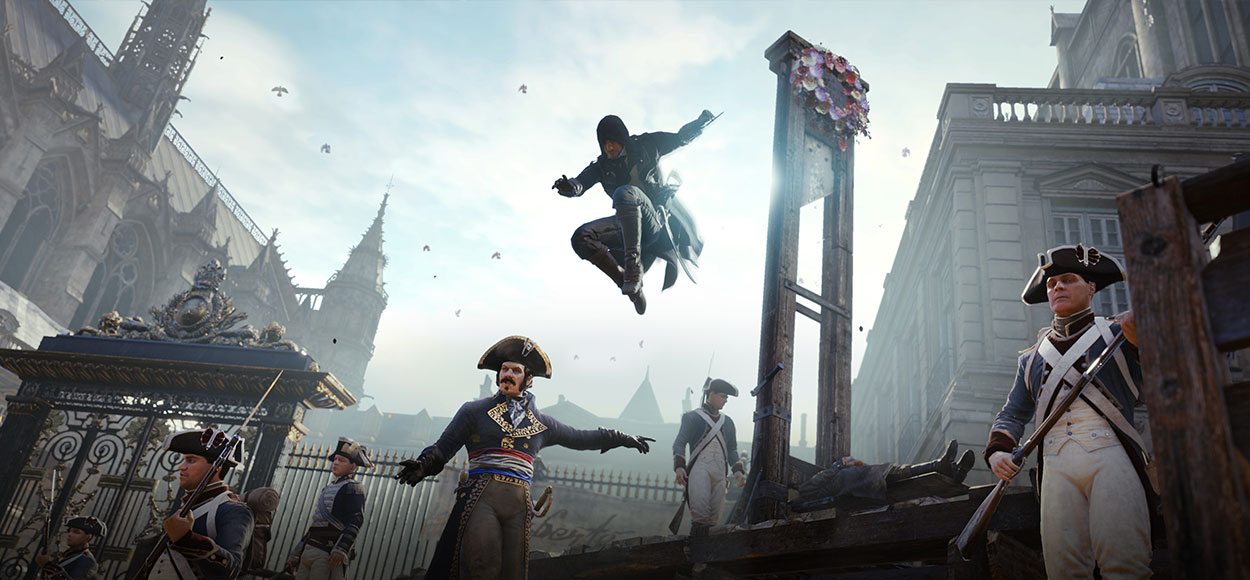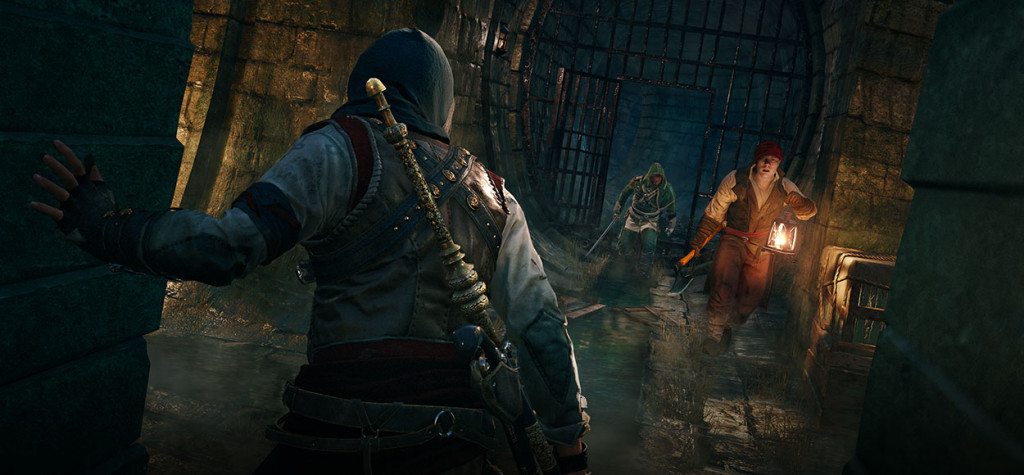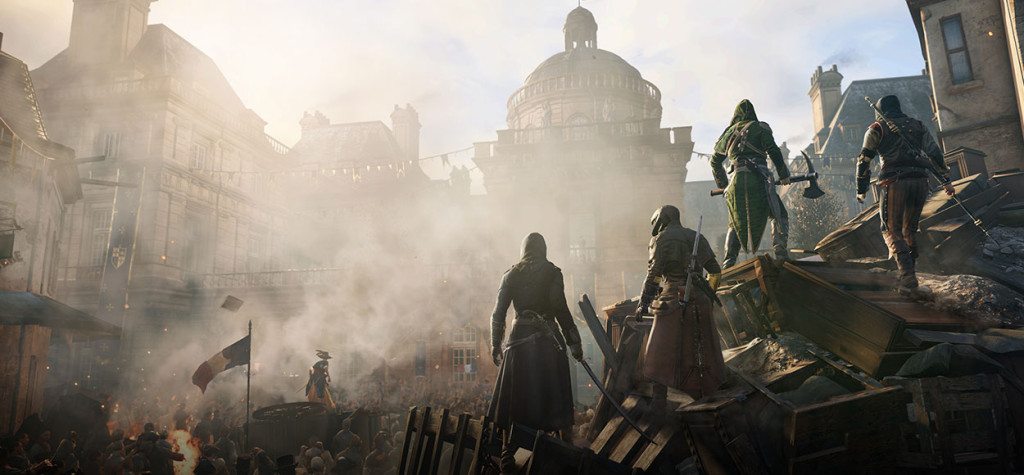Vive la Révolution!
Platforms: PS4, Xbox One, PC
Release Date: Out now
Developer: Ubisoft Montreal
Publisher: Ubisoft
Since its beginnings in 2007 the Assassin’s Creed franchise has been able to polarise the gaming public whilst receiving relatively positive reviews from the press. The newest entry into this long-standing, much loved franchise, Assassin’s Creed: Unity, is no exception. It has been accused of being rushed, glitchy and perhaps worst of all, the culmination of Ubisoft’s recent move towards becoming the ‘new EA games’ (AKA: riddled with micro transactions). Whilst these accusations are all based on real issues with the game, none hold water when put to the test.[divider]
Unity has clearly been designed with innovation and improvement in mind. Doubtlessly Ubisoft developers ran into difficulty in attempting to top Assassin’s Creed: Black Flag, arguably one of the best pirate games of all time and certainly the most unique entry in the franchise so far. Unity goes back to the series’ roots, addressing an ongoing set of problems – storylines that are too short, free-running that is never entirely under the player’s control and combat that is enjoyable but simplistic to the point of being ridiculous. For example, in Black Flag the player could easily defeat an enemy frigate by themselves, taking maybe a single hit at most.
The free-running mechanic at the franchise’s core has been revamped in a simple but revolutionary way. The protagonist, Arno, can fluidly free-run down as well as up, easing the process of leaping to the ground and preventing needless deaths. Whilst this mechanic makes free-running feel smooth and precise, an additional problem arises in the difficulty of controlling Arno through the extensive interiors of the game from outside. When I realised I merely needed to hold down the left trigger to automatically transition to interiors this problem disappeared, but it took a long time to realise this when the game instructs you to press. However, trigger troubles do not take away from the considerably improved free-running mechanic, and the increased distance of Arno’s leaps, while ultimately unrealistic, made for a much more empowering experience.
Combat is another much improved aspect of Unity. Unlike previous games, in which the only real challenge came from glitches, Unity allows you to both trick your way out of combat when overwhelmed by using smoke bombs or it gives you the option of continuing the fight at your own peril. If you concentrate and have the right gear equipped for your fighting style and enemy’s level, a challenging and rewarding fight will ensue.
Granted, the combat is not as challenging or rewarding as that in Dark Souls, but that isn’t what one expects or wants from an Assassin’s Creed game. Instead the game allows you (once you have practiced and carefully selected gear and skills) to destroy enemies in a way that previous games in the franchise haven’t, making it feel like you’ve earned this power. A difficult feeling to create in a game, but one that Unity delivers in spades.
Unity succeeds where Revelations and AC III did not in making minor activities and side missions enjoyable
The aforementioned level system was likely introduced as an extension of the similar ship system in Black Flag and improves the pacing of Unity. Previous entries in the franchise (I’m looking at you, Revelations) have had a terrible sense of repetition without the feeling of achievement that can come with it. I really enjoy games that take a simple concept and repeat it indefinitely in pursuit of an almost unattainably large goal (normally outside of the actual storyline). Other good examples of this include the Dynasty Warriors franchise and Shadow of Mordor.
Unity succeeds where Revelations and AC III did not in making minor activities and side missions enjoyable. In fact, I found the story itself took a back seat to my exploration, money-making and random fights with Templar fanatics. The level system facilitated this by allowing the player more freedom to explore areas that challenged them appropriately.
The ability to customise one’s experience in games is the most innovative aspect of gaming today. Nearly all major franchises are now moving in this direction. In Unity this is embodied in three different weapon types, six armour types, four small skill trees and four different stats to advance in line with the players preferred playing style: Melee, Health, Stealth and Ranged. Arno can be kitted out as a tank, a ranged scout, a melee creeper – or all of the above. The weapons aren’t carbon copies of each other but are bizarre and unique, such as the duckfoot pistol.
Whilst Unity is undoubtedly a joy to play it does slip up in certain areas, as all ambitious games do. Glitchy combat elements, falling through the map and bad hit detection in finishers become irritating but never game-breaking. These problems also have reduced dramatically with swift and extensive patches, several released in the first week alone.
Assassin’s Creed Unity is a promising continuation of the series. I’ll refrain from spoiling the story, but I would advise all players to go in remembering the failures of AC III and Revelations, rather than the soaring emotional heights of Black Flag. It starts off rather clumsily but confronts some very interesting concepts that hark back to the highlights of Ezio’s story in AC II.
[divider_top]
![]() Have your say about Assassin’s Creed: Unity on our Twitter page, @BoarGames.
Have your say about Assassin’s Creed: Unity on our Twitter page, @BoarGames.




Comments